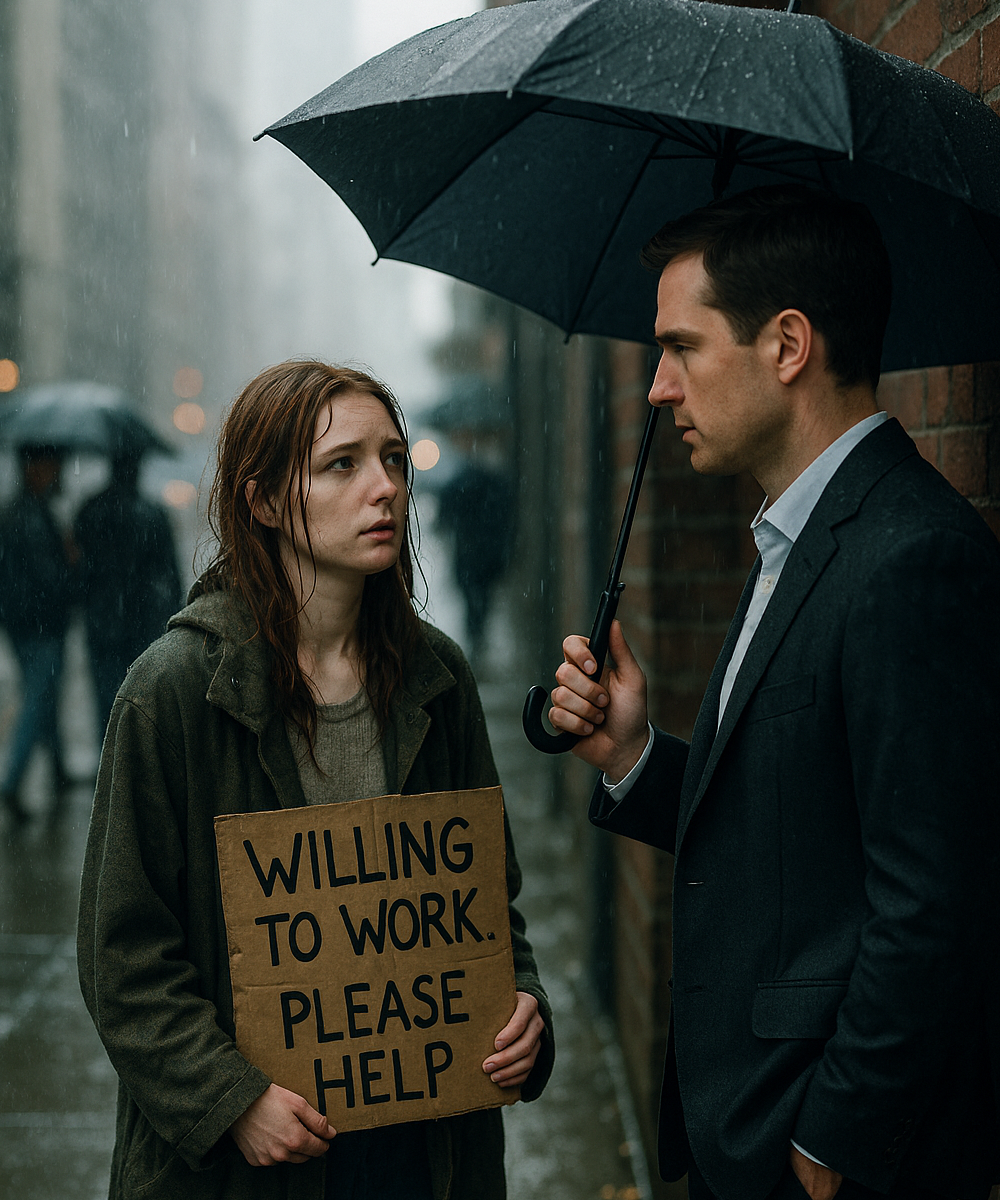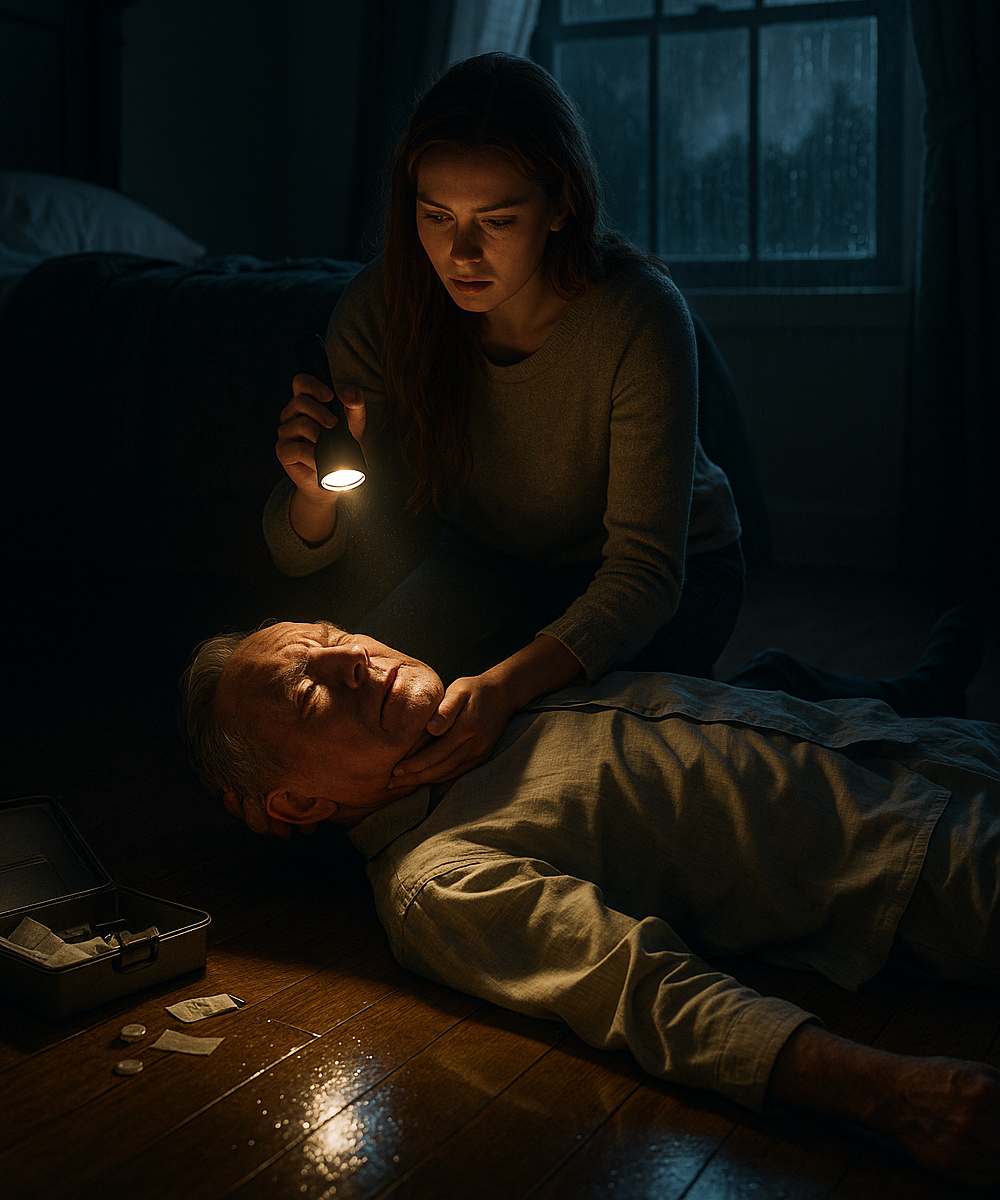
The rain poured down in relentless sheets, turning the sidewalks into tiny rivers. People hurried past under umbrellas, shoulders hunched against the cold August storm.
But she stood still.
In a faded coat far too big for her frame, auburn hair plastered to her cheeks, the young woman leaned against the brick wall of a small café. A damp piece of cardboard rested in her hands with five simple words: “Willing to work. Please help.”
Alexander Hayes, a self-made tech millionaire, rarely noticed people like her. His life was all meetings, glowing screens, and the quiet hum of jet engines. But that morning, restless from worry about his father’s latest fall, he had decided to walk instead of ride.
His eyes skimmed past her — and then stopped.
She wasn’t begging. Her gaze wasn’t pleading. She looked… steady. Like someone holding on to her last piece of dignity.
He slowed, turned back, and stepped closer.
“You’re looking for work?” he asked over the sound of the rain.
She looked up, green eyes vivid against pale, rain-chilled skin.
“Yes,” she said softly. “Anything honest.”
She couldn’t have been more than twenty-one. Thin, tired, but alert. Not lost in any haze—just hungry.
“What’s your name?”
“Lila Carter.”
“What kind of work have you done?”
“Waitressing. Housekeeping. I also cared for my grandmother when she had dementia—bathing her, feeding her, and keeping her safe. I’m a quick learner. I… I just need a real chance.”
It wasn’t a speech. It was the truth. And it hit him hard.
“My father needs help,” Alexander said without hesitation. “He had a stroke last year and uses a wheelchair. His caregiver quit this morning. You’d have room, meals, a salary, and full benefits.”
Her brows drew together. “I’m not looking for charity—”
“This isn’t charity,” he interrupted. “It’s a job. One I need filled today. Will you take it?”
After a beat, she nodded. “Yes.”
His home, a modern estate by the Hudson River, was all glass, stone, and quiet. When Lila arrived later that day, dripping wet with a single backpack, the staff exchanged doubtful glances.
Alexander’s voice was firm: “She’s the new caregiver. Treat her with respect.”
That night, she met Thomas Hayes.
Once a sharp-witted professor, now he sat in a wheelchair, half his body weakened. His voice was gravelly, but his eyes were still bright.
“You’re the new one?”
“Yes, sir.”
“You’re young. Think you can lift an old man like me?”
She smiled gently. “We’ll figure it out.”
For the first time in months, he didn’t resist help getting into bed.
Days slipped into weeks.
Lila rose early to brew Mr. Hayes’s tea exactly how he liked it—strong, with a hint of milk. She dressed him, rolled him out into the garden when the weather was kind, and listened as he told long stories about books, ideas, and Alexander’s boyhood.
Slowly, Alexander noticed changes. His father was laughing again. Asking for books. Even teasing the staff.
“You have a gift, Lila,” Alexander remarked one evening.
She shrugged. “Sometimes, people just want to be seen—not for their illness, not for their mistakes, just for who they are.”
He found himself watching her more—the way she moved, the calm she carried.
One rainy night, he came home late and found her reading one of his father’s old novels.
“You read Dostoevsky?”
“I read whatever I can,” she smiled.
He hesitated, then asked, “Why were you on that street corner?”
Her voice was steady. Her mother had passed when she was sixteen, her stepfather was unkind, and she’d left home at seventeen. She worked until the pandemic closed her restaurant. Then came couch-surfing, shelters, and finally the streets. No addictions, no trouble—just bad luck.
“But I never stopped hoping,” she finished quietly.
From then on, their paths crossed more often—shared meals, garden walks, and laughter.
Then came the night that changed everything.

A storm knocked out the power. The generator failed. Lila grabbed a flashlight and hurried to Mr. Hayes’s room—to find him pale, gasping for breath.
The phones were down. The staff was on the far side of the property.
Without hesitation, she pulled the emergency injection kit from the drawer—something she’d only been shown once—and used it, speaking softly as she helped him breathe.
Ten minutes later, Alexander burst in, soaked from the storm. She told him what happened. His father was already recovering, color returning to his cheeks.
“You saved him,” Alexander said in disbelief.
She shook her head, tears in her eyes. “He saved me first. He made me feel needed again.”
Mr. Hayes recovered fully—and refused to let her leave. “She’s the daughter I never had,” he declared.
A few weeks later, on a crisp autumn morning, Alexander proposed on the back porch with golden leaves swirling around them.
“I didn’t plan to fall in love with you,” he said with a smile. “But I did.”
She laughed through happy tears. “Yes.”
Their wedding was simple and full of warmth. Mr. Hayes gave a toast that left no dry eyes. And Lila—once alone in the rain—danced in an ivory gown, joy shining in her face.
Together, they later built a foundation for young women facing homelessness, offering housing, education, and work opportunities.
When a reporter once asked Alexander, “Why Lila?” His answer was simple:
“Because she reminded me that compassion isn’t weakness — and that the richest hearts often start with the humblest beginnings. The day I met her, I didn’t see a homeless girl. I saw the strongest person I’d ever known.”